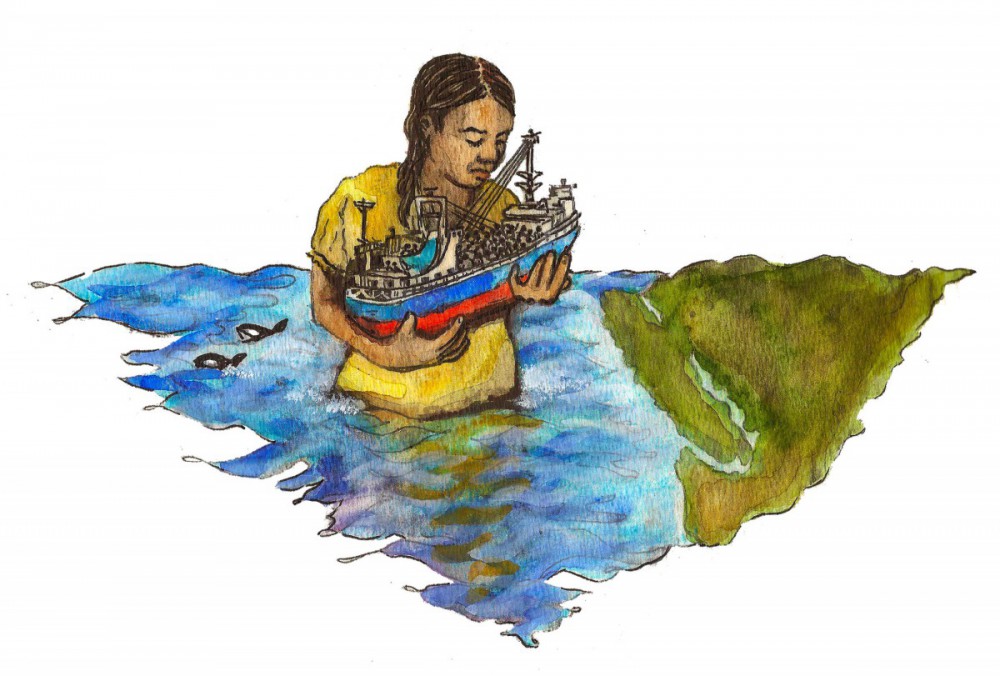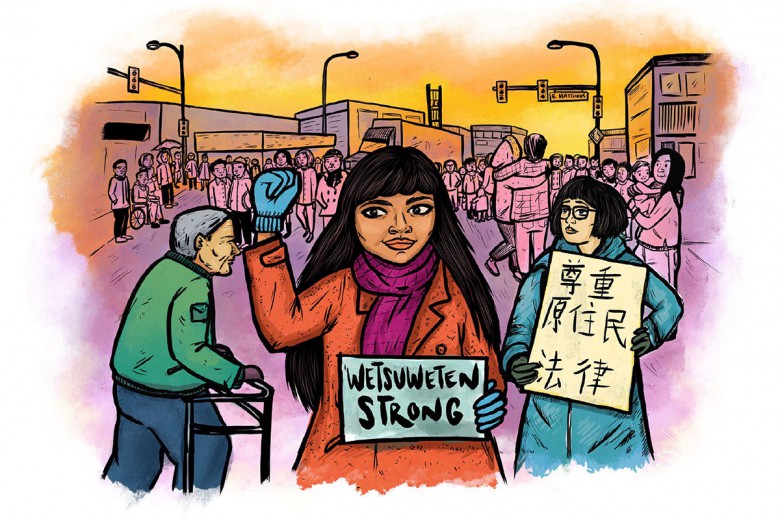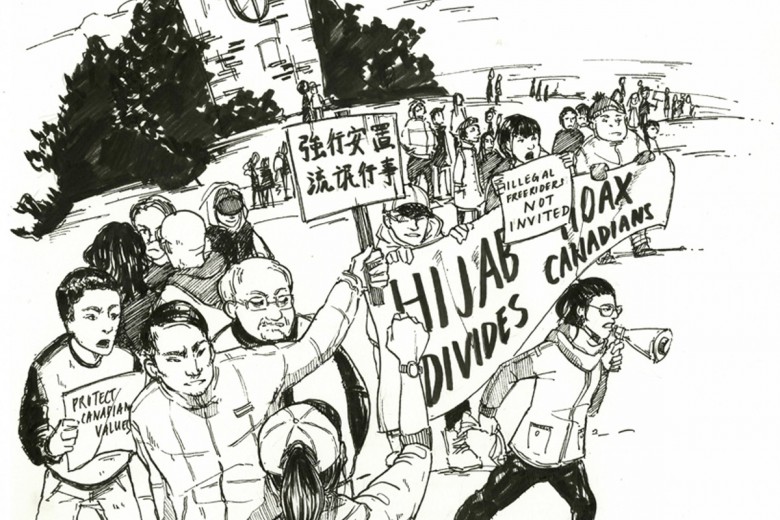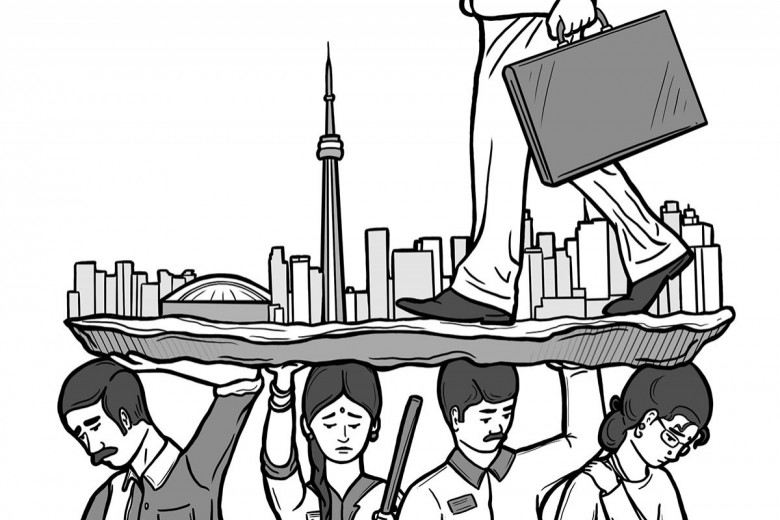
In August 2010, the MV Sun Sea arrived in Vancouver carrying 492 Tamil refugees fleeing post-war Sri Lanka. All on board were immediately detained upon arrival in Canada. Nearly a year later, 19 are still in jail. Their mass imprisonment came on the heels of the detention of 76 Tamil refugees who arrived in October 2009 aboard the leaking Ocean Lady. The Conservative government had then insisted that all the refugees on board were terrorists. It would be fully six months before the government would admit that it never had any evidence to substantiate those claims.
By then, however, it was too late: anti-Tamil and anti-refugee hysteria had spread like wildfire. The MV Sun Sea arrived mere weeks after the most tepid of mea culpas from the government for its wilful mistreatment and misrepresentation of the Ocean Lady refugees. Yet the new wave of hysteria that greeted the recent arrivals was arguably worse than the first. Whereas the Conservatives had previously focused their attentions on individual boats, they have now undertaken an aggressive campaign to systemically undercut protections afforded to all refugees.
Bill C-49 has been central to this campaign of fearmongering. Modelled off Australian immigration laws that Australia’s own High Court has overturned, the proposed legislation mandates the detention of refugees who arrive in Canada by means the minister considers “irregular” – primarily, by boat. The bill directly contravenes several of Canada’s domestic and international obligations and has attracted the attention of Amnesty International.
Human Cargo: The Ocean Lady and the MV Sun Sea
In May 2009, the Sri Lankan government ended 26 years of civil war against the Liberation Tigers of Tamil Eelam by killing of tens of thousands of Tamil civilians. The government followed its declaration of victory by forcing over a quarter of a million Tamil civilians into detention camps. Numerous NGOs condemned the desperate living conditions in the camps, citing severe overcrowding, erratic medical care and irregular access to water. About a third of children under the age of five in the camps were moderately or severely malnourished. Meanwhile, roughly 12,000 detainees were transferred, on suspicion of involvement with the LTTE, to separate prisons operated by Sri Lankan security forces and affiliated paramilitary groups. Many of these groups are documented violators of human rights.
Small wonder, then, that people are fleeing Sri Lanka. Yet the escapes they attempt are only marginally less dangerous than the situations they leave behind. One of the Ocean Lady migrants described his 45-day-long journey thus: “All of the faces on the ship were new; no one knew each other. What I saw were people who feared for their lives … This is a journey that plays with death: We faced seven or eight treacherous storms, and I remember one — on maybe Oct. 10 or Oct. 11 — that still haunts me. I thought death was inevitable.”
Upon arrival, all 76 refugees aboard the Ocean Lady were taken to a Vancouver jail while the Canadian government went into overdrive. Alykhan Velshi, Minister Kenney’s spokesperson, went on record with rhetoric flamboyant enough to rival most Internet message boards, proclaiming that: “We won’t allow Canada to become a place of refuge for terrorists, thugs, snakeheads and other violent foreign criminals.”
The refugees remained in jail while the government argued in court that they were terrorists and thus ineligible to make refugee claims. The RCMP contacted the Sri Lankan government to identify the detainees, endangering the lives of relatives still in Sri Lanka. By January, the government had been forced to release them all, but it would be another six months before Canadian authorities would finally admit that they never had proof for their allegations of terrorism.
On August 13, scarcely a month after that admission, after nearly three months at sea, the Sun Sea arrived in Victoria. There were 492 people on board, including women and children, not counting one person who had already died at sea. Several of the children were removed from their parents and placed in B.C. foster care. Everyone else was moved to jails. Men, including teenagers, were detained in the Fraser Regional Correctional Centre, the Lower Mainland’s primary provincial jail. Women without children were detained at the Alouette Correctional Centre for Women. Mothers and children were detained at the Burnaby Youth Custody Services Centre. One pregnant woman who had originally been detained at Alouette was transferred to the Burnaby jail after her delivery.
This mass imprisonment occurred at the same time that the Conservatives revealed that, despite falling crime rates, they intended to spend billions of dollars on expanding prisons. In addition, provincial officials have stated that B.C. will receive “full compensation” from Ottawa for “housing” the migrants. All of this demonstrates how snarled Canada’s immigration and prison systems have become. Yet few care to admit that if refugees are a financial burden on the system it is because Canada spends hundreds of thousands of dollars jailing them.
The machinery that allows for this wholesale criminalization of refugees extends well beyond the walls of Canadian jails and extends into the arena of shoddy mainstream journalism. One Ottawa Sun editorial suggested firing on the ship: “Lock and load would be our approach.” The sensationalism of most media outlets encouraged fears of “tides” of refugees pouring into Canada. In fact, only a small minority of the 20 million refugees worldwide make claims in the West: Canada accepts less than 0.1 per cent of this population, and the Sun Sea migrants make up only 0.1 per cent of the refugees who even apply to Canada.
In fact, the number of Sea Sun migrants is about the same as the number of asylum seekers who arrive in Canada by plane in a week, but politicians have always been quicker to agitate about migrants who arrive on derelict boats than those who arrive by plane. A Conservative party ad released in April depicted the MV Sun Sea refugees as “criminals who target Canadian generosity.” It would seem that the mediating involvement of sleek airlines allay a broader paranoia about migrants in regards to employment and social welfare, indicating that classism is as much a driving force in this hysteria as racism.
For weeks after its arrival, every article about the Sun Sea opened by recounting the allegations of terrorism that had dogged the Ocean Lady migrants. Most of these newer articles did not mention that all those allegations had been shown false. Instead, they relied on statements from government advisors whom the Immigration and Refugee Board had discredited. The National Post was especially egregious. It authoritatively reported that: “According to a Canada Border Services Agency report – marked secret and obtained by the Vancouver Sun through the Access to Information Act – at least 25 of the 76 migrants were members of the Tamil Tigers.” The CBSA created this report in January, the Vancouver Sun published it in June, and the CBSA publicly recanted it in July.
The vilification of the Sun Sea migrants was so unchecked that the day after their arrival, infamous neo-Nazi Paul Fromm was able to arrange a rally of “concerned citizens of Victoria” at CFB Esquimalt where the migrants were then being held. Fromm, who had already arranged a rally with the Aryan Guard outside Kenney’s Alberta office, sent out a press release entitled “Stop the Tamil Tiger Smuggling Ship.” Its premise was that, “The Sun Sea is just the beginning of an all-out invasion.” To that end, it concludes with “Send the illegals back!!!!!”
Fromm’s demands were given uncritical coverage in mainstream media for weeks following the Sun Sea’s arrival. Media outlets such as CTV and Victoria’s main radio station, C-FAX 1070, were happy to serve as Fromm’s soapbox. Neither outlet disclosed his connections with the Ku Klux Klan, thereby assisting in the spread of his hate and racism.
Unsurprisingly, there has been no mainstream acknowledgment of the hypocrisy of Canada, a settler nation built on the theft and appropriation of Indigenous lands, having the audacity to jail people who have arrived seeking safety. Instead, the media has conflated refugee and criminal by presenting the collective punishment of the Sun Sea migrants as necessary “to reverse this country’s growing international reputation as an easy mark.” Meanwhile, 19 of the migrants are still being held in jail. To date, only two migrants have been found to be inadmissible to Canada because, as one Immigration and Refugee Board adjudicator described it, the federal government’s evidence is “trivial, unreliable and riddled with mistakes and speculation.” However, those migrants who were released from detention are now being subject to surprise visits by border agents.
Our Welcome Mat: Bill C-49
This hostile welcome to the migrants of the Sun Sea and Ocean Lady draws on a long history in Canada of turning away people in need. In 1914, the Komagata Maru arrived in Vancouver with 376 Indian passengers. One newspaper headline read “Hindu invaders now in Vancouver harbour.” (Most of the refugees were Sikh.) They were forbidden from disembarking. The passengers were detained on board for two months until the ship was finally forced to leave. Upon their return to India, British soldiers killed 20 of the passengers.
In 1939, during World War II, the St. Louis, carrying over 900 Jewish passengers fleeing Nazi Germany, sought entry into Canada. Justice Minister Ernest Lapointe pronounced himself “emphatically opposed” to allowing the refugees entrance. An anonymous immigration officer would proclaim the infamous words, “None is too many.” And so the ship finally returned to Europe. Most of its passengers were killed in concentration camps.
In 2008, the federal and the B.C. provincial governments were forced to issue apologies for the Komagata Maru. Now, just three years later, if those words are to mean anything, we cannot afford to repeat that history. Instead, the Conservatives devoted much energy this past winter attempting to push through Bill C-49 which would give the government broad discretionary powers to designate groups of refugee claimants as “irregular arrivals.” The bill does not define “irregular,” leaving that determination to the whims of the minister. The bill does provide that once the minister has designated a group of asylum seekers as irregular, everyone in that group – including children – must be jailed for a year with no access to review processes. Moreover, the bill mandates retroactive designations for arrivals in Canada since March 31, 2009. This is a transparent attempt to recriminalize the passengers of the Ocean Lady and MV Sun Sea.
The arbitrary detention, the separation of families and the criminalization of underground means of entry puts the bill in direct contravention of domestic and international law, ranging from the Canadian Charter of Rights and Freedoms to the 1951 UN Convention relating to the Status of Refugees and the International Covenant on Civil and Political Rights.
The bill was initially tabled when the Conservatives were a minority government. It was opposed by all the other parties. Having won a majority in Parliament in May, the Conservatives no longer need the support of opposition parties to pass the bill. Accordingly, they have reassured the public that they will pass bill shortly.
What Would Harriet Tubman Do?
The Conservatives insist that the purpose of Bill C-49, entitled Preventing Human Smugglers from Abusing Canada’s Immigration System Act, is to target human smugglers, not refugees. But as the body of the bill indicates, this is patently false. Nonetheless, the Conservatives were able to exploit that misrepresentation to their benefit by incorporating choleric party ads about the dangers of human smuggling during the federal elections. For that matter, even opposition parties stated that while they opposed the bill’s treatment of refugees, they did support crackdowns on human smugglers. The government has stated that its chief problem with smugglers is that by “charging people large sums of money for their transportation, human smugglers have made a lucrative business.”
Ironically, Canada’s refugee system is a lucrative source of profit for the government. The government keeps the money collected from rejected applicants and collects interests on loans that refugees must take out from the government if they seek reunification with their families. All of this occurs while the government is all but extinguishing funding for sponsorships and settlement services. Meanwhile, the Canada Border Services Agency began demanding in April that detainees prove that they had paid off smugglers before being released. The government argued that the detainees were flight risks who might go underground to pay off their debts (despite the fact that claimants are allowed work in Canada while their refugee claims are being decided). Thus, the CBSA is effectively operating as a debt collector for smugglers even as the Conservative government rails against the evils of human smuggling.
In any event, the dichotomy between the powerless refugee and the evil smuggler is a false one, and one with dire implications for refugees. The more dangerous or difficult it is to get across a border to safety alone, the more critical it becomes to hire smugglers to navigate those barriers to escape and entry. Smugglers thus often act as the critical bridge to get people to safety.
For instance, during World War II, Russian Raoul Wallenberg saved thousands of Jews, including Albert Einstein, by providing them with illegal Swedish passports falsely identifying the holders as Swedes so that they could escape the Nazis. Wallenberg himself eventually spent 30 years in the gulag, where he died. Closer to home, North America boasts its own history of human smuggling with the Underground Railroad and Harriet Tubman. By 1850 alone, hundreds of thousands of people had credited that network of safe houses, secret routes and human smugglers with their rescue from white American slaveholders. We cannot allow the memories of Wallenberg, Tubman and countless others to be so diluted that we are unable acknowledge the vital work that contemporary human smugglers continue to provide. Without doubt, refugees must be protected against exploitative smuggling practices, but the sweeping demonization of smugglers and refugees only exacerbates those dangers.
Across Canada, communities and activists remain alert to this government’s persistent exploitation of xenophobia and nationalistic paranoia to push through unjust legislation. But we do not despair in the face of violent bureaucracies. Rather, we take strength and courage in the histories and current mappings of refuge and shelter that connect people – despite borders and across waters.
An earlier version of this article was first published on Pulsemedia.org, and has been reprinted with permission.






